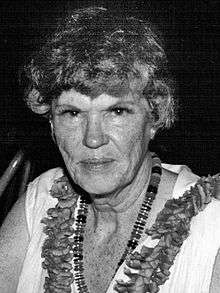Helen Andersen
Helen Andersen (July 14, 1919 – December 23, 1995), was a Canadian artist best known for expressionist paintings about Pacific Northwest coast Indigenous peoples. Her subjects were often women, themes expressing her convictions about social justice and strong anti-war sentiments.

About half of Andersen's works are independent of her political views. They explore design and colour, often playfully, for their own sake.
Early years
Born Helen Severson McKay Anderson in North Battleford, Saskatchewan, Canada, Andersen began painting in her teens, with some instruction from her physician father Dr. William Edmund Anderson, himself a "capable artist".[1] Her appreciation of indigenous art began in the same period, as her father was an avid collector of aboriginal art and artifacts.
Like her father, Andersen chose medicine as her profession, graduating as a Registered Nurse in 1940 from the Regina General Hospital School of Nursing.
Andersen's surnames
Her maiden name, Anderson, is coincidentally similar to her married name, Andersen. She married twice, first to Robert Malcolm Ross in the 1940s. When the Ross marriage ended in divorce in the 1950s, she remarried to Fritz Raabye Andersen.
Artistic career
Andersen's career as a painter began in the late 1950s when she enrolled in art classes in Vancouver, her home for many years. Gordon "Kit" Thorne,[2] a local artist many years her senior was an early mentor.
In the 1950s and 60s, women artists in Vancouver had particular difficulty gaining recognition. Most artists, female or male, supported themselves with income from other jobs. Andersen worked as a nurse and as a salesperson for educational courses, painting and studying as time permitted. She was also raising her children. Nevertheless, she continued to paint and study under such notables as John Koerner, Joe Plaskett, Bill Porteous and Jacques de Tonnacour. She counted Bill Reid and Jack Shadbolt and Max Maynard among her artist friends, admiring their work but not studying under them.
During the 1970s and 80s, Andersen's style evolved, influenced by an eclectic appreciation of styles ranging from expressionism to hard edge abstraction. She arrived at a unique style of her own; direct, brightly coloured and emotionally expressive.
Activism in the Peace Movement
Andersen was a peace activist from the 1960s until her death, attending many Ban The Bomb marches and peace rallies in the 1960s when she lived in Vancouver, British Columbia. She continued her involvement when she moved to Saanichton on Vancouver Island, on into the 1990s. Her large painting Nuclear Mother[3] recorded her horror of nuclear weapons. In an art brut style, it depicts a grieving mother holding her slain infant.
Awards and recognition
Andersen's work was shown in solo exhibitions and juried group shows throughout her career.[4] Her best reviews[5] were written by Robert Amos, art critic for the Times Colonist, Victoria's newspaper.
She received a 1992 Lescarbot Award from the Government of Canada, recognizing outstanding contributions to community cultural activities. These included promotion of other artists by mounting group shows, lecturing and demonstrating techniques on television and teaching in her own studio. She served twice as Secretary of the Canadian Federation of Artists.[6]
Received a 1987 prize in a Competition of Toys and Games Preparing For Life and Peace, organized by the Polish Peace Committee. The Canada Council provided a travel grant to travel to Warsaw and receive her award.[7] Her award was for a parlour game called "Saying Yes To Peace".
References
- "Obituaries". Canadian Medical Association Journal. 39 (1): 96. PMC 536637.
- "Gordon Kit Thorne Artwork for Sale at Online Auction | Gordon Kit Thorne Biography & Info". invaluable.com.
- ""Nuclear Mother" | Helen Andersen, Artist (1919-1995)".
- "Helen Andersen Art Shows | Helen Andersen, Artist (1919-1995)".
- "Times Colonist review | Helen Andersen, Artist (1919-1995)".
- "Home - Federation of Canadian Artists, Canada's largest national arts service organization for visual artists". artists.ca.
- http://www.canadacouncil.ca/~/media/Files/Annual%20Reports/1989/1988-1989%20Supplement.pdf